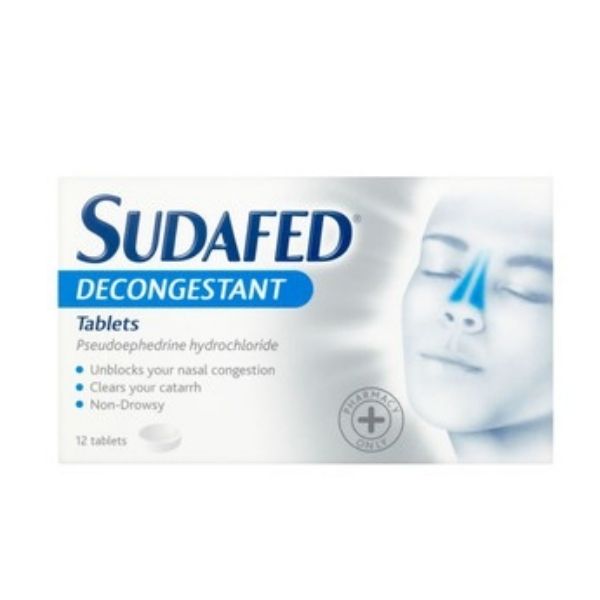
Sudafed - Decongestant x12 Tablets (P)
Sudafed Decongestant Tablets
12 Tablets
Sudafed Decongestant Tablets are used to provide relief from cold, flu and allergy symptoms such as blocked sinuses, stuffy nose and catarrh.
The tablets contain pseudoephedrine hydrochloride, which is a decongestant that relieves nasal and sinus congestion.
How to Use:
For oral use only.
Do not take more than the stated dose shown.
Take with a glass of water.
Children under 12 years old:
Do not give to children under 12 years old.
Adults and children aged 12 years and over:
Take one tablet every 4 - 6 hours, up to 4 times a day.
Leave at least 4 hours between doses.
Do not take more than 4 tablets in 24 hours.
If symptoms persist talk to your doctor.
If anyone has too much contact a doctor or your nearest Accident & Emergency Department (Casualty) taking the leaflet and pack with you.
If you forget to take a dose, take the next dose when needed provided that the last dose was taken at least 4 hours ago. Do not take a double dose.
Ingredients:
Active ingredient: Pseudoephedrine hydrochloride 60 mg per tablet.
Other ingredients are: Lactose, microcrystalline cellulose, maize starch, silica, magnesium stearate, hypromellose, polyethylene glycol, talc and red iron oxide (E172).
Warnings:
If anyone has too much contact a doctor or your nearest Accident & Emergency Department (Casualty) taking the leaflet and pack with you.
If you forget to take a dose, take the next dose when needed provided that the last dose was taken at least 4 hours ago. Do not take a double dose.
Do not use this medicine:
- If you have ever had a bad reaction (e.g. rash, swelling of the face and throat, difficulty breathing) to any of the ingredients.
- If you have very high blood pressure or severe heart disease.
- If you are taking, or have taken in the last two weeks, drugs for depression known as Monoamine Oxidase Inhibitors (MAOIs).
- If any of these apply to you, get advice from a doctor or pharmacist without using Sudafed Decongestant Tablets.
Talk to your doctor or pharmacist:
- If you have liver or kidney problems.
- If you have high blood pressure or heart disease.
- If you have diabetes or have been diagnosed with an intolerance to some sugars.
- If you have an overactive thyroid gland.
- If you have glaucoma (increased pressure in the eye).
- If you have prostate problems (difficulty with passing water or needing to pass water often).
If you are taking any other medicines, including:
- Antihypertensives (drugs used to treat high blood pressure, such as guanethidine, methyldopa, alpha and beta blockers, debrisoquine, bretylium and betanidine).
- Sympathomimetic drugs (stimulants or appetite suppressants and drugs used to treat congestion and asthma).
- Tricyclic antidepressants (used to treat mood disorders).
If you are not sure about any of the medicines you are taking, show the bottle or pack to your pharmacist.
If any of these bullet points apply to you now or in the past, talk to a doctor or pharmacist.
Ask your doctor or pharmacist for advice before taking this medicine if you are pregnant or breast-feeding.
Some of the ingredients can cause problems
This medicine contains lactose. If you have been told by your doctor that you have an intolerance to some sugars, contact your doctor before taking this medicine.
If anyone experiences any of the following, stop using this medicine and talk to your doctor:
A few people have had hallucinations, but this is rare.
Occasionally people get skin rashes that are sometimes itchy.
A few men, especially men with prostate problems, may have trouble passing water.
Other effects which may occur include restlessness, having trouble getting to sleep or bad dreams.
If you experience any side-effects not included in this leaflet or are not sure about anything, talk to your doctor or pharmacist.
Store below 30˚C in the original package to protect from moisture.
Keep the product out of the reach and sight of children.
Do not use after the end of the month shown as an expiry date on the packaging.
Medicines should not be disposed of via wastewater or household waste. Ask your pharmacist how to dispose of medicines no longer required. These measures will help to protect the environment.
